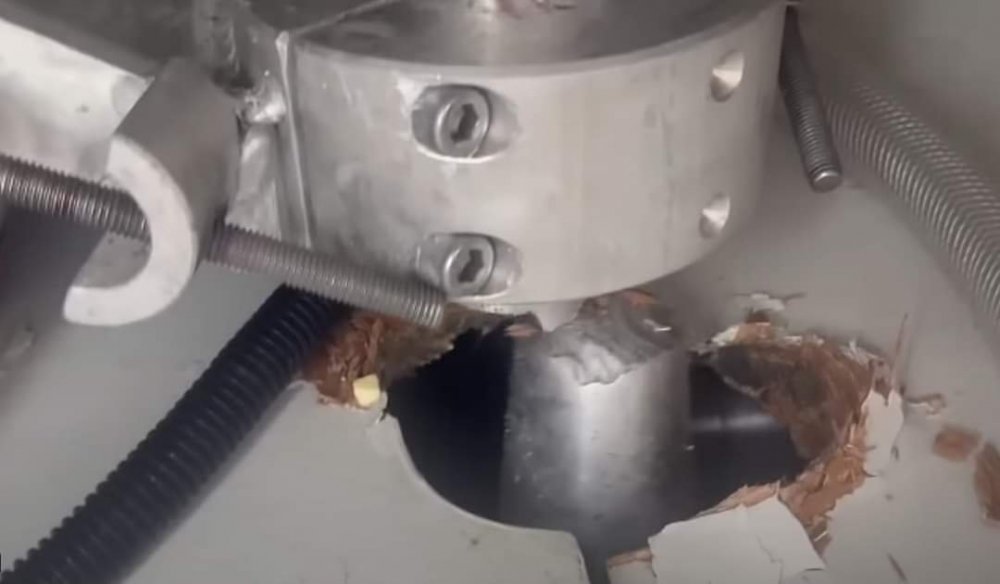-
Content Count
8,505 -
Joined
-
Last visited
-
Days Won
244
Content Type
Profiles
Media Demo
Forums
Gallery
Calendar
Store
Posts posted by Island Time
-
-
Ok, further to that.
Today I have made a complaint to the Plumbers, Gasfitters and Drainlayers Board as follows.
"I would like to complain about the current situation regarding LPG on Boats.
To get a gas cert for the vessel is currently impossible without a complete reinstall.
The issue is that despite current standard, page iii "This Standard includes a statement that its requirements do not apply retrospectively" the gas fitters are insisting on compliance with the CURRENT standards, even for an EXISTING installation. This is in direct contradiction to the current standard, page iii as quoted above.
From the standard, this clause means that if the system complied at the time of install, and is in good order, it still complies.
Currently I cannot find an installer who understands this. I work in the marine industry, and know of multiple vessels removing gas altogether due to this issue, and others being forced to spend 1000's sometimes 10's of thousands to comply as per a new installation, when their existing ones were safe and compliant at the time of install.
Please can I have a response stating that these existing installs do comply (if in good order), and therefore are acceptable for a gas certificate, or where in the standards or laws this interpretation is in error. This response can then be provided to a licensed gas fitter on inspection, to ensure that money is not wasted on an already compliant system."Be interesting to see if there is any response!
-
 10
10
-
-
I totally understand your position. It's a shambles and I don't believe was the intention of the standard.
The issue is that the gas installers wont take the "risk" of signing off the install, even though it IS compliant with current standards (Through the retrospective clause). They feel they are at risk, and are not prepared to accept that "risk". IMO this is a failure of the gas registration and education system.
My boat is in the same situation as yours - built in 1988. My insurance condition report stated "gas compliant at time of install" and that was accepted.
There are very few NZ laws that are retrospective. For example, the electrical regs are updated say every 5 -10 years. If you had to be compliant with the new ones, then every building in the country would have to be rewired each time. That is patently ridiculous. The ONLY time a reg IS retrospective, is when a safety issue is identified, and then it states it IS RETROSPECTIVE.
-
3 hours ago, K4309 said:
That is quiet irrelevant, especially for insurance purposes.
Two reasons:
The insurance co's via the condition assessment reports want to know if the boat complies with the current NZ standards, not the standards from 1975, and
If a gas fitter touches anything on the system, then the whole system needs to be upgraded. Noting that you aren't allowed to touch anything yourself and have to get a gas fitter even to crimp a hose clip.
There are several reasons a gas fitter may need to touch the system, one being the standard flexible hose (1869 class C) that costs $12/m from Burnsco is supposed to be replaced every 7 years, and you can't replace it yourself. People may want their old system pressure tested as a basic and prudent check. Installing a pressure test point at the regulator would also require the whole system to be inspected / upgraded.
Of course any replacements would also trigger the upgrade, say a regulator, new stove etc.
Sorry but that is not correct.
If a boat complied with the regs when it was built it still complies, unless in poor or unsafe condition. That is what "Retrospective" means.
I agree that if anything is changed, that needs to comply with the regs at the time it was changed. You do NOT need to redo the whole system just to replace a gas line (for example).
The issue is finding someone who actually understands the regs.
The insurance co "condition reports" I've seen just say does the gas install comply with NZ standards, not "Current standards" the "current standard" says clearly it is not retrospective, and therefore a system that complied at time of build and is still in good order does "comply with current standards".
Show me where in the standards this is not so.
-
The main thing to note is, from page iii
"This Standard includes a statement that its requirements do not apply retrospectively"
-
 1
1
-
 1
1
-
-
4 hours ago, K4309 said:
All the above is why I went for lead-carbon over lithium. Much the same reason as why Aardvark when for a kerosene stove over LPG. It avoids a whole lot of compliance issues. Standard charging profile and voltage profile, no need for a BMS and no risk of blowing the alternator in an uncontrolled load dump.
I have taken multiple sets (3) of lead carbon batts out of customers boats this year - premature failures, all approx 2 years old.. All have gone Lifepo4
-
 1
1
-
-
5 hours ago, ballystick said:
Why is it so critical to have an audible alarm for low voltage? This seems to be a regulation for commercial operations or similar.
Because the battery will turn off, possibly at a critical moment - no lights, no nav gear etc. Known as "dark ship". That's what the regs are trying to avoid.
-
 2
2
-
-
On 16/04/2024 at 5:13 PM, harrytom said:
makes interesting
Great info!
-
 1
1
-
-
2 minutes ago, CarpeDiem said:
As the standard is not legislated in leisure craft it would only cause an issue with your insurance if and only if your insurance company required compliance with the specific (or latest) standard. My insurance policy has no such wording.
As the banks are in parallel then if the voltage goes high, eg, 14.7v all 4 BMS's will shutdown within seconds of each other.
Likewise a continuous current draw of merely a few amps that brings a single cell to the low voltage disconnect level will have a cascading effect across all 4 BMS's and they will all shut down within minutes of each other.
Having multiple batteries in parallel does not reduce the likelihood of a BMS shutdown across all the batteries due to high or low cell voltage.
The standards makes no allowance for "leisure craft". ABYC E13 OR AUS/NZS 3004. Just because a craft is not inspected doesn't exempt it . Yes I realize a standard itself is not law.
Yes, there are situations that could take out all the BMS units together. High (or low voltage) is an example. Much more likely is a single cell tripping one BMS - high or low temp, high or low voltage due to balance or other issues.
IMO.
-
Just a note here. That install does not meet ABYC or AS/NZS standards for a Lithium install. That COULD cause an insurance problem. Most of the issue it it has no external comms to "provide visual and audible" warning of an impending shutdown - but it's unlikely to ever shut down as there are, in effect, 4 BMS's making 4 banks...
-
Bow batteries are cranking batts, (or should be!) So voltage is what matters.
Ideally the balmar should be controlled by the battery BMS, so it does have current measurement etc. If it's not, it should be. The bms can switch the balmar ignition wire safely.
So, when the house is a bit down, turn off the start and thruster batts, and make sure the alt is putting out full output. If not, adjust the balmar till it is.
Combiners for charge are not great - the banks being charged are different types and chemistry, and have different charge profiles. Ideally alt to house only, and DC-DC for the other two.
There is no need for huge dc-dc, as neither the start nor the thruster batts should run for long periods. I often use around 20a for this.
Move the winch to the house bank.
-
On 12/04/2024 at 6:47 PM, Jon said:
Just register offshore and away you go
My point was that the rudder shaft appears undersized, and that the NZ regs re rudder shafts are what one of our leading designers suggests are "minimums".
-
 1
1
-
-
21 hours ago, B00B00 said:
Could work for me. I currently have a 100A balmar alternator and MC614 Smart regulator charging 400AH lifepo4 but the whole setup is under performing. The charge is split 3 ways to the bow battery bank, house and start. I was considering changing to a DC-DC charger setup.
Why is it under performing? Should be a pretty good setup. What continuous amps does the alt output, and at what alt temp?
If it's not over 90 amps, then it's not set up right.
-
5 hours ago, Bad Kitty said:
So Arcona obviously don't believe in watertight bulkheads?
Jeez that'd be hard to watch.
Hope they're all ok.
Most of the production boats don't have watertight bulkhead. Some have dams - didn't work great for the titanic!
Also, an 85mm alloy rudder shaft wouldn't meet cat 1 here in NZ.
-
Video:
-
 1
1
-
 1
1
-
-
-
a frigate is generally regarded as the smallest vessel all weather all ocean capable. The Navy, like all of our very limited Armed Forces, are there to play our part internationally, and provide resources for Natural disasters.
The ChCH earthquake and Cyclone Gabriel are classic examples - you want to discuss this with the people of Napier and East cape about what the defense forces did for them ? The Government has virtually no other resources to use.
Our Defense forces are bleeding experienced people as they are so under resourced. The resource we have is supposed to complement those of our close defense partners, as we can not expect a country of 5.5 mil to have complete modern defense capabilities.
The world is more unstable now than for some time, it's not the time to run down the military IMO.
Think about history - Brittan's defense was "unnecessary" according to many before the Napoleonic wars, again in 1913, again in early 1940's - and in all cases took time to rebuild. Other countries have similar examples. Are we not supposed to learn from history?
-
 5
5
-
-
30 minutes ago, Guest said:
Exactly what is the wording on Aus/Nz std? Meaning HV/LW audible warning at a cellular level Or// at a battery level? Not so subtle electrical diff. Obviously cellular is better imo.
Pretty easy to add a BMV712 and get an audible warning. Also utilise mid point take off. And if you dont like the 712 volume (low) use the relay with a louder one. Or, the offender at a cellar level is easily identified & monitored with a voltage sensitive configurable relay to a piezo. $20. Same cell wins the race in both batteries every time, not by much. But its really consistent thanks to Mr Ohm and the chemistry/ manufacture QC. If a different cell Sh*ts itself then you are relying on battery monitor setting audible warning. Having a switching BMS would be preferable to putting one on each cell. (VSR)
Not hard to run some tests with bms cutting off charge /discharge, check battery Voltage and allow delta for BMV setting for alarm. Of course this means a battery monitor with relay & bms for each battery . Still more economical than Rec, electrodacus etc and contactors x N. Don't see how they can demand it be auto.
Personally I prefer simplicity, and do the switching myself. Point is, does this level meet the std? I am not doing it for a job, DIY personal, so it doesn't matter i guess.
Batteries= cells in series with own BMS. Bank = paralleled batteries output same voltage, twice Ahrs. (only for the confused)
Both voltage and temp at cell level;
"(b) Each lithium ion battery shall be provided with a battery management safety system (BMS) either integrated into a battery pack or as a separate component located adjacent to the battery. The BMS shall continuously monitor the voltage and temperature of each cell in the battery.
(c) All charging sources shall be automatically disconnected by the BMS when voltage exceeds the manufacturer’s recommended maximum.
(d) All connected load shall be automatically disconnected by the BMS when the voltage falls below the manufacturer’s recommended minimum.
(e) The battery shall be automatically disconnected by the BMS from all connected load and all charging sources when temperature exceeds the manufacturer’s specified maximum.
(f) The BMS shall provide an audible and visual alarm at the normal vessel operating position before a disconnection event occurs."
-
 2
2
-
-
Take the ply ones in to acrylic creations - they will make new ones for a very reasonable price...
-
 1
1
-
-
2 hours ago, Ex Machina said:
Nice simple summary of Lifepo4 install .
https://svviolethour.com/2023/10/23/lithium-battery-system-install-on-our-sailboat/
Be careful of quoting installs that don't meet ABYC or AUS/NZS regs. The stumbling block for most drop ins is that they must have both visual and auto warnings before switching off the batts. Bluetooth units can't do this - or at least any Ive seen. If you look for a BMS with CAN bus (or any external coms) then you can comply...
-
Any time. Sometimes even newish ones - I had one brand new one that looked fine, but wasn't - the rubber, I think, was moving around the metal inner it's mounted on, but only under load....
-
 1
1
-
-
Electrical fires are one of the most common causes of fire on vessels like ours. Have a plan - You MUST be able to turn off the batteries, or the fire may re-ignite. Extinguishers in service and at multiple locations. 1/Shut off batts. 2/Shut off air and fuel 3/ use fire fighting systems, installed or hand held. Hopefully all this while another crew member issues a mayday, and another gets the raft ready...
My maritime fire fighting course just confirmed that you are unlikely to control a serious fire - get ready to get off!!
Oh, and if you have a race yacht and it's a lithium battery fire (won't be if it's LiFePo4!), get off!!
-
 4
4
-
-
Here is a quote from the standard:
“This Standard includes a statement that its requirements do not apply retrospectively”. Page 4/114, AS/NZS 5601.2
-
I’m with Nautical insurance, underwriter is vero. Island Time is Sept 88. So I got the request for “survey”. Read the request carefully. The broker (Nautical) sent the forms with the policy renewal. It’s NOT a real survey, and did not require out of water. It’s a condition report, and can be done by a boat builder, surveyor, (and maybe some others). I got a mate who’s a boat builder to complete it for me. It did NOT ask for a gas cert ( which would be a problem) just that it was in good order and complies with nz regs. Which it did at time of install (but not with current version - that’s ok, the gas regs are not retrospective) . Completed in an hour and accepted by Nautical. No real issue here.
-
 4
4
-
-
16 hours ago, Mandy said:
When using Propspeed on the Kiwiprop blades are you using primer and the clear?
Cheers, Mandy
Yes.




Recommendations for getting gas checked
in TechTalk
Posted
Well, if nothing, next is to pass it on to an MP - isnt this Govt supposed to be removing red tape